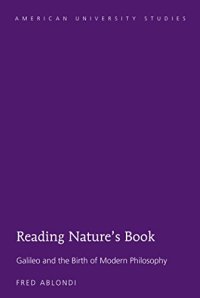
Ebook: Reading Nature’s Book: Galileo and the Birth of Modern Philosophy
Author: Fred Ablondi
- Tags: Italy, Europe, History, Historiography, Historical Study & Educational Resources, History, Physics, Acoustics & Sound, Applied, Astrophysics, Biophysics, Chaos Theory, Chemical Physics, Cosmology, Dynamics, Electromagnetism, Electron Microscopy, Energy, Engineering, Entropy, Gas Mechanics, Geophysics, Gravity, Light, Mathematical Physics, Mechanics, Microscopy, Nanostructures, Nuclear Physics, Optics, Quantum Chemistry, Quantum Theory, Relativity, Solid-State Physics, System Theory, Time, Waves & Wave Mechanics, Science & Math, Medi
- Series: American University Studies
- Year: 2015
- Publisher: Peter Lang
- Edition: New edition
- Language: English
- pdf
Galileo Galilei (1564–1642) is widely recognized as one of the greatest scientific thinkers in history. Intriguingly, when offered a place in the Medici court in 1610, he requested the title of «Philosopher and Chief Mathematician.» Reading Nature’s Book: Galileo and the Birth of Modern Philosophy is the first book-length study written with undergraduates in mind that examines the philosophical implications (both theoretical and historical) of Galileo’s scientific discoveries, including many matters that were later taken up by seventeenth- and eighteenth-century philosophers. This close analysis of Galileo’s philosophical insights demonstrates the prominent place his thought should have in the history of early modern philosophy.
Reading Nature’s Book provides contextual material for college and university students enrolled in modern philosophy courses, introducing them to ideas and concepts that dominated philosophical discussion during the era. Furthermore, students and scholars interested in the history of philosophy of science will also benefit from a decidedly philosophical approach to such a leading scientific figure. Many of the topics explored by Galileo continue to be of philosophical interest today, including scientific methodology and the relation between science and religion.
Reading Nature’s Book provides contextual material for college and university students enrolled in modern philosophy courses, introducing them to ideas and concepts that dominated philosophical discussion during the era. Furthermore, students and scholars interested in the history of philosophy of science will also benefit from a decidedly philosophical approach to such a leading scientific figure. Many of the topics explored by Galileo continue to be of philosophical interest today, including scientific methodology and the relation between science and religion.
Download the book Reading Nature’s Book: Galileo and the Birth of Modern Philosophy for free or read online
Continue reading on any device:

Last viewed books
Related books
{related-news}
Comments (0)